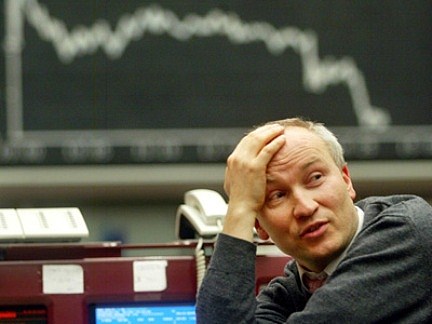
Gold bullion prices hovered in a narrow range below $1750 an ounce in Monday morning’s London session, after recovering some ground lost during Asian trading.
“We traded through lots of stop [losses] this morning,” said one trader in Singapore, after gold began the week by dropping more than ten Dollars to $1742 per ounce, its lowest level in nearly three weeks.
Like gold, silver bullion also fell during Monday’s Asian session, touching a five-week low before climbing to $33.33 per ounce by lunchtime in London.
“The failure to break above the March high at $37.47 is disappointing,” says Scotia Mocatta’s latest technical analysis report. “[But] the long term uptrend remains in place with support at $27.75.”
Stock markets and the Euro also rallied following a speech by US Federal Reserve chairman Ben Bernanke defending US quantitative easing and a promise from German leaders that nothing “uncontrollable” will happen in Europe.
In New York, the difference between the aggregate number of long (bullish) and short (bearish) contracts held by noncommercial gold futures and options traders on the Comex – known as the speculative net long – rose for the eighth week running in the week ended last Tuesday, according to Commodity Futures Trading Commission data published late Friday.
Spec long growth however was less than 2% on the week, the slowest rate for the entire eight-week period, which began before and continued after the Fed’s announcement of a third round of quantitative easing (QE3) last month, at which it committed to open-ended mortgage-backed securities buying.
“Momentum continues to slow,” says Marc Ground, commodities strategist at Standard Bank. “It appears as though investors continue to question the ability of QE3 to support prices and/or the longevity of Fed’s open-ended commitment to easing.”
Speaking at a seminar in Tokyo yesterday, Fed chairman Bernanke defended western quantitative easing policies against accusations that they impose adverse effects on emerging economies.
“I am sympathetic to the challenges faced by many economies in a world of volatile international capital flows,” Bernanke said, acknowledging that accommodative policies in the US “shift interest rate differentials in favor of emerging markets” and contribute to flows of private money into their currencies. “But by boosting US spending and growth, [monetary easing] has the effect of helping support the global economy as well.”
China’s exports meantime grow 9.9% year-on-year to September, almost double what many analysts forecast, official data published Saturday show.
“However, there is a sizeable seasonal effect in September, likely related to Christmas exports,” points out Stephen Green, head of research, Greater China at Standard Chartered.
Chinese consumer price inflation dipped to 1.9% last month, down from 2.0% a month earlier, according to figures published Monday.
“The drop was almost entirely due to a normalization of vegetable prices,” says Societe Generale economist Wei Yao. “However, other food components continued to rise…we expect more notable rebound [in inflation] to start in November.”
Here in Europe, Spain could ask for a bailout next month as part of a package that would also include assistance for Cyprus and revised conditions for Greece, according a Reuters report published Monday.
“The [reason for the combined package] is because the Germans and others do not want to go many times to national parliaments and have painful, tortuous debates there,” an unnamed Eurozone official told the newswire.
German chancellor Angela Merkel said today there will be no “uncontrollable developments” in the Eurozone, echoing the words of her finance minister Wolfgang Schaeuble.
“It will not happen that there will be a ‘Staatsbankrott’ in Greece,” Schaeuble told a forum in Singapore Sunday, using a German phrase for state bankruptcy despite delivering the rest of his remarks in English.
Sweden’s finance minister Anders Borg however predicted Friday that Greece will leave the Euro within six months. Sweden is not a member of the 17-nation single currency.
Gold bullion refiners in India have seen increased activity this year following the imposition of a higher import duty on refined bars back in January, the Economic Times of India reports.
In Africa meantime, 100 Chinese workers have been detained for suspected illegal gold mining, China Daily reports.



 Follow us on Twitter
Follow us on Twitter Become our facebook fan
Become our facebook fan










Comments are closed.